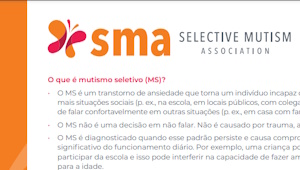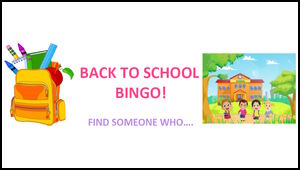Online Library
504 Plan Suggestions
Below are specific accommodations and considerations for the school and classroom. It is important to note that not all of the accommodations listed below are appropriate for every student with SM; accommodations should be selected by a qualified professional upon careful assessment of each student’s developmental level, current needs, and strengths. Moreover, as a student makes progress, accommodations should evolve to reflect the student’s growth and changing needs. For most students with SM, changes to a 504 plan should be considered several times each academic year.
Promoting Classroom Comfort and Engagement; Building Strong Teacher-Student Relationships
- The school will identify a primary point person who will be responsible for practicing “brave talking” with STUDENT and communicating about STUDENT’s needs, goals, and progress to other team members. This person may be a classroom teacher, teaching assistant, school psychologist, social worker, school counselor, speech/language pathologist, special education teacher, or other school-based professional.
- STUDENT will benefit from individual meetings, with his/her point person, focused on relationship building, establishing speech at school, and generalizing speech to different settings/people. Ideally, these meetings should take place several times a week for 15-30 minutes each. Early meetings should occur one-on-one, in a private space, without any other students or adults present. The point person will use behavioral strategies including shaping, stimulus fading, and positive reinforcement to reduce anxiety and increase verbal communication.
- STUDENT should be encouraged to increase participation in classroom activities, even if communication is non-verbal at first. Initially, allow STUDENT to use non-verbal communication techniques (e.g., gestures, nodding, pointing to a picture card, writing, moving his/her lips) to answer questions and/or to make her/his needs known until ready to use verbalizations. However, as STUDENT progresses, attempts should be made to reinforce only verbal communication. Allowing these interventions for non-verbal communication should be considered short-term only so as to not provide an avoidance strategy.
- STUDENT should be included in all classroom activities, instructional and curricular work. Classroom participation and engagement should be encouraged. If STUDENT is not yet speaking, assign her/him nonverbal jobs/responsibilities in the classroom (e.g., cleanup, line leader). Once speaking, assign STUDENT classroom job or activity that would promote verbalization with others in the classroom (e.g., asking what snack they want/have).
- STUDENT will be preferentially assigned a seat in the classroom, next to close friends and/or already established conversational partners. Even if classroom seat assignments change regularly throughout the year, STUDENT should still always sit next to or at the same table as one close friend, but with the addition of peers with whom they may not yet speak.
- Assign scheduled times for bathroom breaks and allow STUDENT and a peer to go to the bathroom together. Initially, if STUDENT is not yet speaking in the classroom, create a system through which STUDENT can non-verbally and unobtrusively request permission to use the bathroom at other times, if needed. If the STUDENT is speaking, provide positive reinforcement for the STUDENT asking to use the bathroom in one-on-one situations or in small groups.
- At least once a week the classroom teacher will provide individual time with STUDENT, and possibly a friend or two, before school, during lunch or after school. This will allow STUDENT extra time to build comfort and develop rapport with his/her teacher. Activities during this time should be based on child-preferences, should promote student-teacher connection, and should be free of speech demands. Examples include drawing, play dough, playing with Legos or other building materials, doing puzzles, and playing with dolls or action figures.
- Allow for early arrival to class, to allow STUDENT extra time to get comfortable and warm up in the morning.
- Prepare STUDENT for changes in routine and special large group activities (e.g., substitutes, fire drills, schedule changes, field trips).
- If available, STUDENT may benefit from participation in school-based mental health services (e.g., working with a school counselor or therapist, participating in a social skills group).
Asking Questions and Responding to Verbalizations
- Teachers should phrase questions using a forced-choice format as much as possible. Forced-choice questions provide scaffolding that often helps support students with SM to respond verbally. Sample forced-choice questions include:
- “Do you think the answer is 73, 59, or do you not know?”
- “Do you want pizza, a hamburger, or something else for lunch?”
- “Did you remember to bring in your library book or did you leave it at home?”
- For most students with SM, yes/no questions are contraindicated, since they are very easy to answer non-verbally, and even verbal responses provide only minimal opportunities for brave talking practice. Therefore, teachers should take care to avoid asking STUDENT yes/no questions as often as possible. Though at first it may feel unnatural, yes/no questions can often be turned into forced-choice questions. For example:
- “Did you finish your worksheet yet?” can be rephrased as “Did you finish your worksheet yet or do you need more time?”
- “Do you have to go to the bathroom?” can be rephrased as “Do you have to go to the bathroom or do you not have to go to the bathroom?”
- Allow STUDENT at least five seconds to answer questions, either nonverbally or verbally. Avoid eye contact when awaiting her/his response if necessary, as to not increase anxiety.
- If STUDENT responds non-verbally (e.g., by pointing or nodding) and he/she is working on speaking goals, acknowledge STUDENT’s gesture and prompt him/her for a verbal response:
- “I see you nodding your head. Please tell me using your words.”
- “Thanks for pointing. Please let me know with your words if you want the green paper or the blue paper.”
- Teachers should avoid (until ready) asking STUDENT open-ended questions that require lengthy or more abstract responses and instead, focus on asking more concrete, fact-based questions, which will be easier for STUDENT to answer.
- Refrain from calling attention to whether STUDENT talks. If STUDENT verbally responds to a question, reflect his/her response, and provide brief, matter of fact praise. For example, if the STUDENT was asked to name the capital of France, and responded verbally, a helpful teacher reply could be, “Paris. That’s right,” or “Paris. Thanks for telling me.” Try to normalize the situation as much as possible.
- A behavior plan or daily report card (DRC) will be created to monitor and reinforce STUDENT’s speech in the classroom using specific positively-phrased goals to be accomplished each day. The details of this behavior plan will be developed by STUDENT’s team in consultation with his/her parents and outside mental health provider, as appropriate.
- Teachers and other school staff members should refrain from asking STUDENT rhetorical questions or other conversational questions to which they do not actually expect an answer, as to not inadvertently create interactions that reinforce STUDENT’S tendency to not respond verbally. For example, instead of saying, “Hi STUDENT. How was your weekend?” it might be more appropriate to offer a greeting that does not require a response like, “Hi STUDENT. I hope you had a good weekend.”
Modifying Exams and Assignments
- Oral assignments (e.g., reading assessments, class presentations) will be adapted as necessary to allow for STUDENT’s optimal participation. Options may include presenting in the empty classroom to a parent, presenting one-on-one to a teacher, presenting one-on-one to a verbal peer, and/or using technology such as video/audio recording to demonstrate their knowledge.
- STUDENT shall be permitted, if necessary, to take any standardized test outside of the regular classroom, either privately or in a small group, administered by a teacher with whom the STUDENT is comfortable, in case [she/he] needs to ask a question or seek clarification. STUDENT shall be given additional time if needed.
- STUDENT should not be punished or criticized because of lack of speech.
- STUDENT’s grades will not be penalized for lack of verbal participation in class. When appropriate, teachers may identify other ways for STUDENT to demonstrate knowledge/participation to earn participation points.
- STUDENT will not be called on in class without preparation/a plan in place.
Facilitating Peer Relationships and Social Engagement
- Pair STUDENT with one or two close peers as much as possible to help him/her feel comfortable in larger groups and in less structured settings. Then, gradually add other peers to STUDENT’s group of buddies.
- STUDENT will be assigned a seat at lunch next to at least one trusted peer.
- STUDENT is sometimes more comfortable talking to friends than to adults. If you overhear him/her speaking to a peer, do not mention that you heard her/him speak unless this is a specific goal STUDENT is working towards.
- The teacher will facilitate small group games and activities to promote STUDENT’S interaction with other children as much as possible. In these situations, STUDENT may benefit from direct instruction in what to say to initiate and respond to conversational prompts. STUDENT also may benefit from gentle reminders about and reinforcement of pro-social skills such as making eye contact.
- STUDENT may benefit from participating in a small group recess in place of recess with the entire class as well as identifying in advance what particular games or activities will be best for the STUDENT to do to promote verbalization.
- Assign STUDENT to a thoughtfully identified partner (e.g., trusted peer) whenever partnering in activities. Do not wait for STUDENT to initiate or choose a partner or group.
- As STUDENT transitions to a new grade, he/she should be placed in a class with his/her close friends. Parent input about classroom assignments will be taken into consideration.
- Provide STUDENT with social stories to increase confidence in how to engage in social interactions.
Communication Between School and Home
- A home/school communication log or Daily Report Card (DRC) will be developed to provide STUDENT’s parents with regular (daily or weekly) updates about his/her participation in class activities, speech with peers and teachers, and progress toward meeting identified goals. Please review the Selective Mutism Association’s Toolkit for Educators to obtain examples of DRCs for SM.
- STUDENT’s outside mental health provider (e.g., clinical psychologist, social worker) will be invited to participate in team meetings, help school personnel establish brave talking goals, and offer input into his/her accommodation plan.
- STUDENT’s outside mental health provider will be invited to visit the school to conduct brave talking practices to help facilitate the transition of speech to this environment.
- STUDENT’s classroom teacher and/or point person will be available for weekly 15 minute check-in calls with his/her parents and/or his/her outside mental health professional, if requested.
- The school will provide parent/faculty meetings on at least a quarterly basis to report upon STUDENT progress and update accommodations, as necessary.
- As necessary, STUDENT’s parents/family members and/or outside treating professionals will be allowed to have access to the school grounds and building during off hours (before/after school, during the summer) to promote comfort and work on brave talking in the school environment.
- Goals and expectations regarding speech should be clearly explained to STUDENT, in a developmentally appropriate way.
- STUDENT’s educational team will provide feedback to his/her parents about peer relationships, to help his/her family identify peers who may be good matches for out of school playdates for STUDENT.
Preparing for Transitions
- If necessary, identify a new point person early. Allow time for STUDENT’s current point person to facilitate several meetings with the new point person, to help transfer speech. Ideally, these meetings will occur in the late spring, prior to the start of summer vacation.
- Upon moving to a new grade, STUDENT will be carefully matched with a warm and accepting teacher who will be able to continue to implement 504 accommodations and facilitate brave talking practice in the classroom. Family preferences will be considered when making classroom assignments.
- If possible, STUDENT will meet his/her new teacher prior to the end of the previous school year.
- STUDENT and his/her parents will be allowed to meet with his/her new teacher several times at the end of the summer, immediately before the start of the new school year.
Staff Education and Training
- All adults who come into contact with STUDENT will be advised of his/her accommodation plan (e.g., office personnel, specials teachers, cafeteria and recess staff, bus drivers). These adults should greet STUDENT warmly, but not ask STUDENT any questions unless directed to by his/her point person.
- A written summary of pointers and accommodations for STUDENT will be provided to any substitute teacher to reference. Office staff will advise substitutes to reference this
- summary before interacting with STUDENT in the classroom.
- The district will provide faculty training through consultation with professionals with expertise in working with students with SM and/or attendance at SM conferences.
- The district will purchase Selective Mutism educational materials to educate the child’s teachers and all school personnel. Please review the Selective Mutism Association’s Toolkit for Educators.
- Resources on Selective Mutism should be utilized for further suggestions and information about this condition. Please visit the Selective Mutism Association’s website for up-to-date information for teachers, professionals, and parents.
All teachers working directly with STUDENT will complete the online training provided by the Selective Mutism Learning University prior to the beginning of the school year/prior to beginning to provide direct services to STUDENT.




